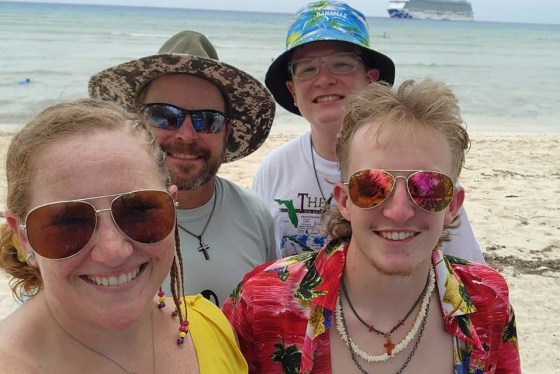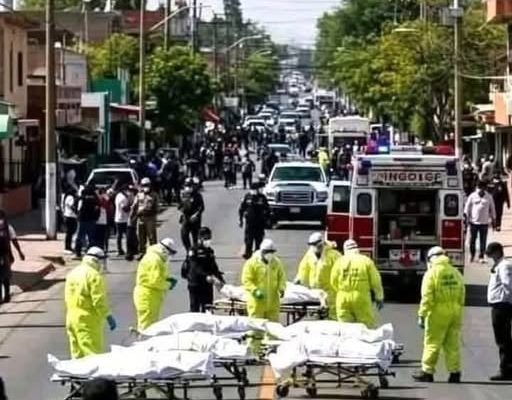The Unbearable Weight: A Nebraska Family’s Tragedy and the Urgent Need for Mental Healthcare Reform
The quiet town of Cozad, Nebraska, was shattered on a Saturday morning in May. What should have been a joyous celebration – the high school graduation of Hudson Koch – became a day of unimaginable grief. The Koch family – Bailey, Jeremy, and their sons Hudson and Asher – were found deceased in their home. The investigation, while ongoing, points towards a long and arduous battle with mental illness.
A Family’s Silent Struggle
A Public Face of Hope, a Private Struggle
Bailey and Jeremy Koch were pillars of their community, known for their kindness, faith, and active involvement in their church. They were deeply loving parents, fiercely devoted to their sons. They bravely shared their journey with Jeremy’s mental health struggles publicly, through a Facebook page titled “Anchoring Hope for Mental Health.” This page became a testament to their resilience, documenting their pursuit of help and their unwavering belief in recovery. Just days before the tragedy, Bailey shared positive news: Jeremy had been released from a mental health facility and they’d begun a new treatment plan. She expressed hope and confidence. However, behind this façade of optimism lay a heavy burden, a constant struggle against a system that, despite their best efforts, ultimately failed them.

The Crushing Weight of Untreated Illness
Bailey’s parents, Lane and Peggy Kugler, stepped forward to share their story not to assign blame, but to highlight a critical national issue: the inadequacy of accessible, timely mental healthcare. They described Jeremy’s condition as a severe mental illness that progressed from depression to psychosis. They emphasized that this wasn’t the Jeremy they knew; it was a disease overpowering a loving husband and father. Bailey, for years, lived with the fear of losing her husband, not only physically, but emotionally, constantly advocating for him within a system she found frustratingly difficult to navigate, particularly in their rural community.
When the System Fails: Navigating the Labyrinth of Mental Healthcare
The Koch family’s experience is tragically common across the United States. Countless families face insurmountable obstacles when seeking mental healthcare: lengthy wait times, insurance limitations, a shortage of providers, and particularly acute challenges in rural areas. This lack of readily available resources, especially early intervention and ongoing support, often leads to devastating consequences.
A National Crisis in Rural America

Nebraska, like many rural states, suffers from a critical shortage of psychiatrists, counselors, and inpatient facilities. For those battling serious mental illnesses like clinical depression or psychosis, the absence of consistent care can be catastrophic. A 2023 NAMI report revealed a stark reality: over half of American adults with mental health conditions received no treatment in the previous year, with this figure significantly higher in rural regions.
Bailey’s Unwavering Fight

Bailey’s Facebook posts offer a poignant glimpse into her unwavering determination. She documented the setbacks – hospitalizations, coverage gaps, the feeling of being lost in the system. She questioned the frustrating complexity and cost of accessing vital mental healthcare. Yet, even amidst frustration, she remained a staunch advocate, encouraging others to speak openly, challenge the stigma, and persist in their fight for treatment, even when the system seemed insurmountable. Her story, though marked by tragedy, stands as a powerful testament to the strength of love, hope, and resilience in the face of immense adversity.
The Ripple Effect and a Call to Action
The loss of the Koch family sent shockwaves through the close-knit community of Cozad. The school district responded with support, offering counseling and holding a vigil. However, the Kuglers, fueled by their grief, have transformed their sorrow into a powerful call for change.
Beyond Blame: A Plea for Reform
Their message is unequivocal: mental illness is a medical condition, not a moral failing. It demands timely diagnosis, sustained support, and consistent treatment. They advocate for systemic changes, urging policymakers to:
- Expand insurance coverage: Ensure comprehensive psychiatric care under both public and private insurance plans.
- Incentivize rural healthcare: Attract and retain mental health professionals in underserved areas.
- Develop crisis response protocols: Create efficient emergency response systems for families grappling with mental health crises.
- Promote public education: Reduce stigma surrounding mental illness and encourage early intervention.
Their plea echoes a desperate need for a system that truly supports families before it’s too late. This isn’t simply a story of one family’s loss; it’s a stark reminder of the urgent need for comprehensive mental healthcare reform across the nation. Let the Koch family’s tragedy serve as a catalyst for change.
If you or someone you know is struggling with mental health, don’t wait. Resources are available — and while they may not always be perfect, they are a starting point:
National Suicide & Crisis Lifeline
📞 988
🌐 988lifeline.org
NAMI Helpline
📞 1-800-950-NAMI (6264)
🌐 www.nami.org
Mental Health America
🌐 www.mhanational.org
Local community health centers, churches, and online therapy platforms also provide free or low-cost services in many areas.
In Memory, In Action
Bailey, Jeremy, Hudson, and Asher Koch are no longer with us — but their story has already inspired deeper conversations across Nebraska and beyond.
Their legacy may yet be one of change: a reminder that mental illness must be treated with the same urgency and compassion as any other health crisis.
Let their memory move us to build better systems, to listen more closely, and to never dismiss a quiet cry for help.
Sources:




